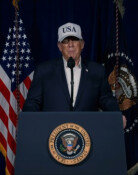Seoul’s appeasement policy towards Pyongyang
Seoul’s appeasement policy towards Pyongyang
Posted June. 16, 2020 07:47,
Updated June. 16, 2020 07:47
“We are not in a place to press ahead with our own will alone, but there certainly are projects that the two Koreas can pursue independently,” claimed South Korean President Moon Jae-in in a video message published to mark the 20th anniversary of the June 15 Joint Declaration, requesting that the North should not close the window for dialogue. It was the first message towards Pyongyang that came amid the sprawling tensions on the peninsula following Kim Yo Jong’s warning to launch military provocations against Seoul.
In a meeting with his cabinet members on Monday morning, Moon claimed, “We’ve reached the time when we can no longer just wait for improvement,” urging Pyongyang to come forward for dialogues. The South Korean president even vowed to take an active role in alleviating sanctions on Pyongyang, stressing that it was time for the South and the North to yield a breakthrough together. It appears that President Moon has chosen appeasement to cope with North Korea’s military threats.
Recently, the Moon administration and the ruling party are trying to woo Pyongyang even more gently in the face of the increasingly harsh threats from the communist regime. Rep. Kim Tae-nyeon, the floor leader of the ruling Democratic Party of Korea, urged to ratify the April 27 Panmunjom Declaration while demanding Washington must recognize exceptions of North Korean sanctions to resume the operation of Kaesong Industrial Park and the tour program to Mt. Kumgang.
If Seoul, potentially the biggest victim of North Korea’s nuclear program, were to play a supportive role in easing the sanctions on North Korea while Pyongyang is turning a deaf ear to the calls for denuclearization, it will make it more difficult to achieve denuclearization by weakening the link of U.S.-ROK coordination and international community.
In his speech, President Moon argued that the agreement to suspend the acts of hostility including the dissemination of leaflets must be complied with, buttressing the administration’s crackdown on leaflets-sending. Leaflets are not the only reason for the intensifying threats from North Korean leadership of late. Pyongyang is staging a desperate brinkmanship against Washington that doesn’t seem to care, apparently resolute to ignore Seoul’s attitude or opinion. Against this backdrop, the South Korean government must do reality check if it is making a major mistake, caught up in a blind optimism that peace will be kept as long as Seoul avoids displeasing Pyongyang.
From the June 15 declaration from 20 years ago to the 2018 joint declaration in Pyongyang, the two Koreas have clinched a great number of agreements, but their recurring patterns of threat and provocation have remained the same. Appeasing them could stall some time, but things will go back to square one anytime soon.
Young-Sik Kim spear@donga.com




![[단독]폴란드, 韓 해군 최초 잠수함 ‘장보고함’ 무상 양도 안받기로](https://dimg.donga.com/c/138/175/90/1/wps/NEWS/IMAGE/2026/02/27/133437397.1.jpg)


